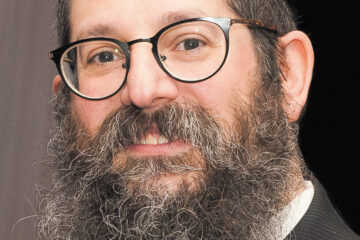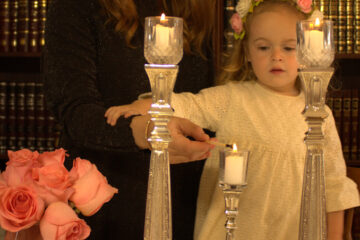Class pursues justice at Hillel Academy
Hillel class
Martha Moody Jacobs
Special To The Dayton Jewish Observer
 At Hillel Academy, it’s 3:30 p.m. on a Thursday. In a classroom, empty desks are arranged in a semicircle. Black judges’ robes are wadded up in a chair.
At Hillel Academy, it’s 3:30 p.m. on a Thursday. In a classroom, empty desks are arranged in a semicircle. Black judges’ robes are wadded up in a chair.
Students, laughing and talking, trample stalks of wheat into the carpet as they leave the room. What is going on here?
Rabbi Nochum Mangel, director of Chabad of Greater Dayton, just completed a lesson about Mishnah, the written record of oral Jewish law.
“You know why I can teach like this?” he asks. “Because I remember when I was a student.” He widens his eyes in feigned bewilderment. “It was all teachers talking.”
Mangel teaches Mishnah to eighth graders two days a week at the Dayton area’s Jewish day school.
“I knew I had two strikes against me,” he says. “It’s Judaics and it’s the end of the day. I had to make it interesting.”
He does this with mock trials, student participation, and various props.
Each day’s lesson starts with a quick introduction to a Mishnah concept. Today the lesson is Jewish law regarding lost objects.
“The Torah says you must return lost objects that the owner can eventually identify, that have a” — he writes a word in Hebrew on the board — “simon, a mark.”
He points to Libby Weprin’s shoes: they could be identified by their stains. Ahuva Fox wears another distinctive object, a broken watch. A just-bought item, in contrast, could not be definitely linked to a certain owner.
Now it’s trial time. Ahuva, Sarah Vandersluis, and Sarah Mangel — the rabbi’s daughter — volunteer to be judges.
They put on black robes and sit in a row behind the teacher’s desk. Mangel distributes various objects to the other students. The students will present these objects to the court as things they’ve found; the judges must decide, by a majority vote, if the student gets to keep an object.
Sam Gugg-enheimer has found three oranges lying on the ground. The judges vote 3-0 that he may keep them.
Yosi Roitman has found some scattered bills and coins. After some discussion the judges reach a decision: Yosi can keep the money unless someone comes forward with an exact accounting of the parti-cular bills and coins he or she lost.
Sarah Dukes has found an intact bag of bagels. Keep it, say the judges.
Yosi has found a sheaf of wheat. Another discussion: is it an ordinary small sheaf? Is it tied in any special way? The judges decide Yosi can keep it.
A circle of figs still in its plastic wrapper — keep it. A circle of figs with a penny slipped under the wrapper—the owner should be sought.
A piece of fabric causes controversy. Nothing special about it, the judges say at first. On closer inspection, the fabric has some stains and a distinctive raveling at its ends. The judges decide its owner must be sought out.
The day’s trials complete, Mangel stands behind a podium near the judges, and opens a book of the Mishnah.
“The Mishnah is the appeals court,” he says. “I want students to think on their own, to try to apply the law before they know the Mishnah.”
He now presents to the students, in both Hebrew and English, the Mishnah’s view of the cases they’ve just observed.
The student judges got all the cases right. Mangel goes over some fine points: the simon (mark) can be how oranges or money are arranged or stacked; a large sheaf of wheat would be viewed differently from a small one. The students nod and wrinkle their foreheads. All seven look totally engrossed.
It helps that these students make up a famously good class. “They spoil a teacher,” Mangel says.
It also helps that Hillel’s Judaics director, Josh Zwelling — who recruited Mangel to teach — gave him the leeway to choose which aspects of Mishnah to teach.
The students say their studies with Mangel have been fun and educational. They recall the little animals he brought in as props; the Mishnah’s prohibition on taking back something you’ve given; the Mishnah’s view on wearing someone else’s tallit (prayer shawl): it’s OK.
“So often Judaics gets a back seat,” Mangel says. “Kids shouldn’t be looking at their watches. The time should go quickly. The class should be practical and relevant to their lives.”
© 2005-06 The Dayton Jewish Observer





